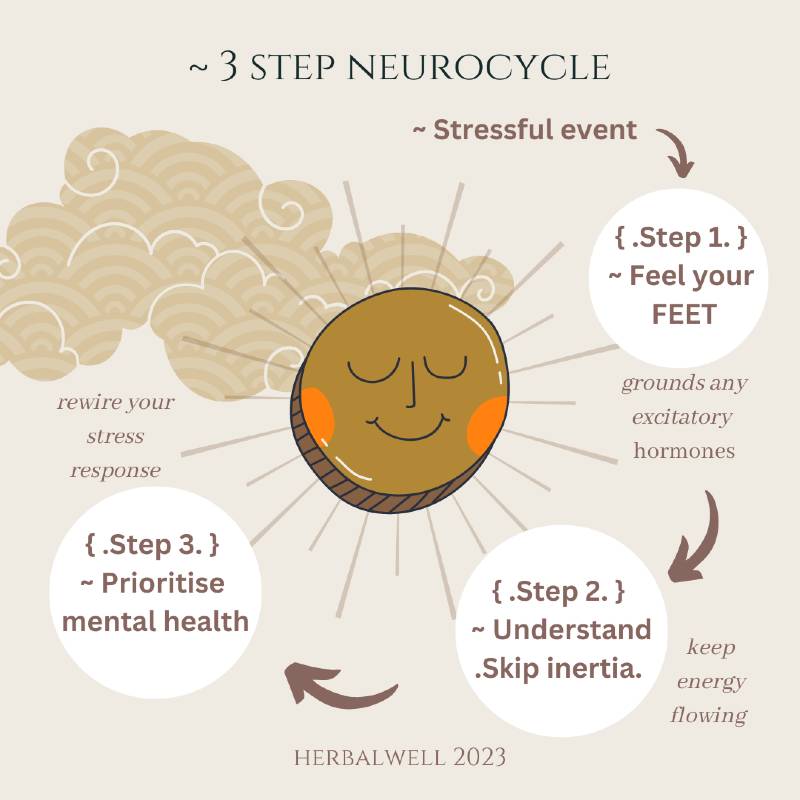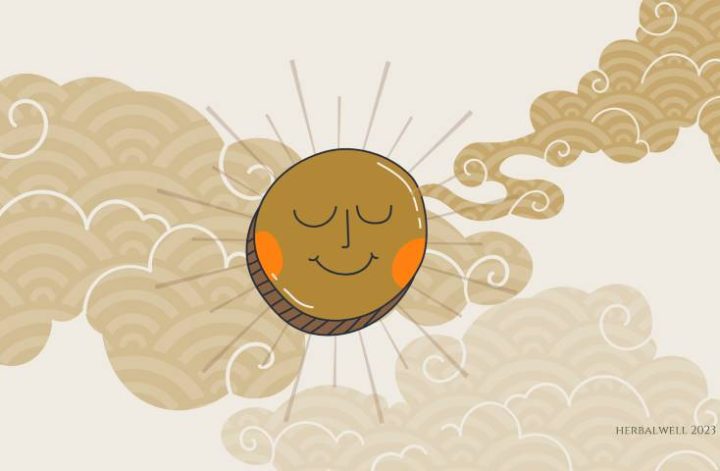You know I’m a big proponent of holistic approaches to great mental health, and this is one the best ways I’ve seen to switch-up your stress response from reactive to responsive…in a really positive and conscious way. I’ll tell you about Neurocycles, the creation of Dr Caroline Leaf, who is incredibly wise and always on my podcast library! And I’ll give you a simple 3-step approach to turning every stressful event into an opportuinty for growth!
I’ve had a mixed relationship with stress since my teens. I was probably stressed before then but most of my more solid memories of stress start in high school. If I’d known then what I know now,….but let’s not go there! Having major stressors occurring in succession in my twenties was what led me into natural medicine, and what saved me as well. My mother was diagnosed with a non-curable cancer, I went through divorce, I’d spent 5 years in the UK, my ‘homeland’ and arrived back in Sydney to start a business ….all over again, and I didn’t feel good about my health or mental wellbeing at all.
At one point I tried to tell my psychotherapist that I wasn’t stressed. But she could read me like a book and I instantly felt like a fraud. I just didn’t want to admit it to myself or anyone else because I thought it made me look weak. Aren’t we all super-people? Don’t we all just soldier on? Truth be told, I’d been through a few things that led up to those sessions and it was a learning journey as much as it was a healing one. I had a lot to learn 😉
So in a way, I’m thankful for those stresses because they brought me here, and now I’m helping community with what I’ve learnt personally and professionally. Stress has been a big focus of my journey in naturopathy, herbalism and nutrition. I mean, when I first saw a neurochemical chart it felt like my brain was on fire! When I began to study Ayurveda and Chinese Herbal Medicine it became clear that pathogenic infections, genetics, chemical imbalances, nutrient deficiencies and diet are only part of the picture when it comes to failing health. The key protagonist driving any chronic condition is much more subtle. Stress is insidious, healthy to a point, until it becomes overwhleming and distressing. Trying to achieve a stress-free life is pretty hard work though, perhaps futile. So maybe it’s better to work on our stress resilience, and identifying our patterns of behaviour when it comes to dealing and responding to stressful events. We have much more control over that!
Stress and emotional disharmony have the potential to initiate many of our symptoms ~ these patterns of disharmony as they call them in Chinese medicine. So we want to arm ourselves with some tools to offset stress, build our stress resilience and avoid stress altogether. This is where the Neurocycle, a concept created by a neuroplasticity pioneer Dr Caroline Leaf, comes in.
What is a neurocycle?
Just to be clear, this is a condensed overview of the concept of a Neurocycle, created by Dr Caroline Leaf. There’s more to this process than what you see here as I’m using only 3 steps and I’ve popped links at the end of this article so you can go away and do more reading if you like.
A Neurocycle is a sequence of practices you can implement whenever you encounter a stressful event, and it shifts you from being a stress ‘reactor’ to becoming a stress ‘responder’ in a more positive way. Essentially it has the power to retrain your brain so that your response to stress is less reactionary, and more reflective, considered and healthy. Check out Caroline Leaf’s website for a much more thorough explanation of neurocycles and her 5 step process.
This is what my 3-Step Neurocycle process looks like:

3 Step Neurocycle for becoming a great stress responder based on Dr Caroline Leaf – Neurocycles. (Sze, 2023)
I explain each step below, one by one.
Step .1. ~ Feel your Feet

Photo: (Hardy, 2023)
When we encounter a stressful event our ‘yang’ (activation) chemistry leaps into action. Chemicals like cortisol and adrenalin are released and blood rushes to our heads. Some of us may get facial flushing, rapid speech, breathlessness, tinnitus, hot cheeks, confusion, racing thoughts, dry mouth, red eyes as part of this process. The chemicals driving this process are known as ‘excitatory’ neurochemicals. Adrenalin is a prime example. You can feel it flooding your bloodstream in highly stressful situations. Their effects in the body are to stimulate and provoke nervous system activity, whether it’s part of a ‘flight or flight’ stress response, or your own patterned behaviours that have developed over the years and define how you handle stress.
The flush of excitatory chemicals traps us in mental reactivity with all this energy directed to the head. So move your attention to your feet. Feel your weight on the earth, the contours of your feet, your toes. This trains your body to be more grounded in times of stress and begins to balance your neurochemistry out so that you’re not just pumping out excitatory chemistry but you’re also releasing feel-good ones too like oxytocin and serotonin.
Step .2. ~ Skip inertia, move straight to understanding
There’s a lot of unknowns in this world, and sometimes we can feel paralysed and unable to move forwards, frozen by our fear of the unpredictable and foreign. But here something really important happens, from a diagnostic point of view. And that is …energy stops flowing. Any holistic system of healing recognises that it is the break of flow in life force, energy, prana, qi (whatever you like to call it), where the seeds of disharmony are sown. So we need to make sure that energy flow isn’t stagnated or broken. We use our innate ability to understand to do this.
Try to seek a logical explanation for this stressful event. Can it be explained? Often once we understand the ‘why’, we’re less thrown by the ‘what’. It doesn’t mean we love it, but we move closer to acceptance which is the only way our nervous systems will let us calm down and de-excite. This begins the process of feeling less overwhelmed and more understanding about the situation, and it becomes a learning opportunity for the future. This is your story that’s unfolding, so think about:
- How could I do it differently next time?
- Am I being flexible enough in my beliefs?
- Am I judging myself negatively as I’m reacting?
- How would I feel if I responded differently?
Those sorts of reflective questions…you get the idea 🙂
Step .3. ~ Act (or not), Prioritise mental health
So now you may already be feeling more okay with what’s happening, and you enter the crucial stage of needing to make a decision. But most of us possess a highly suggestible brain…..which is great because that’s what step 3 is all about. This is where you’re actively reconditioning your stress response. Rewriting the narrative. Authoring your own future story. Knowing that past responses or reactions may not have been that good for your mental health is all you need to know. Your body doesn’t jump into releasing specific amounts of specific excitatory chemicals during stress just because. It does it because that’s what it’s done every time before and it’s going with what it knows. Time to teach it something new. Upgrade the software 🙂
Whatever decision you make at this point, you want it to serve your mental wellbeing as a priority. This could be:
- not doing anything and being okay with that
- responding differently to how you normally would and seeing how that feels
- deferring a decision while you just carry on…because its best for your mental health in the long run
All these things come at a cost of:
- losing something
- upsetting someone
- not meeting our own (sometimes unrealistic) expectations of ourselves
- possibly making a mistake or getting it wrong
However as long as you prioritise your mental health, you’re initiating the transformation of your natural response to the next stressful event. And the more you do this, the more ingrained this behaviour becomes. Update complete! That’s how you change your story when it comes to stress. Because not many of us can live stress-free lives, we can only take on the task of becoming better stress-responders pro-actively, with grace.
I hope you found this useful and that it becomes a tool you can use to bring more power, light and love into your life.


Hey there! Welcome to my world of totally natural and powerful healing medicines. Medicines from nature. Medicine from Source. I’m a naturopath and herbalist with extensive clinical experience working with a range of health conditions including hormonal, metabolic, mental health, sleep and more.
I’ve brought together years of clinical and teaching experience, academic skill and curiosity to bring you this blog. I hope you enjoy it! If you do, leave a comment, I’d love to hear from you!





